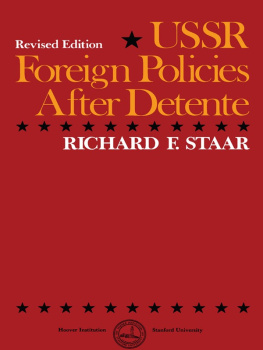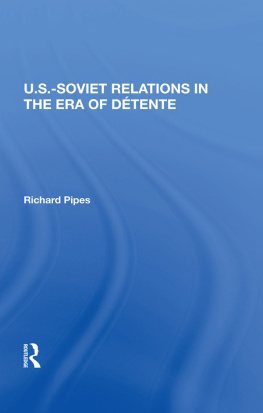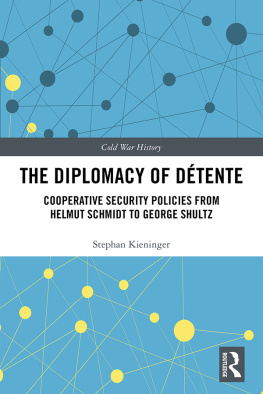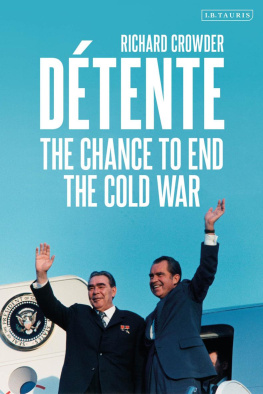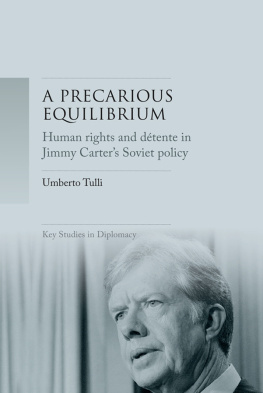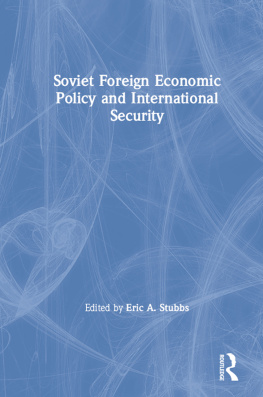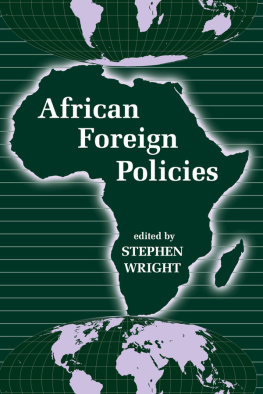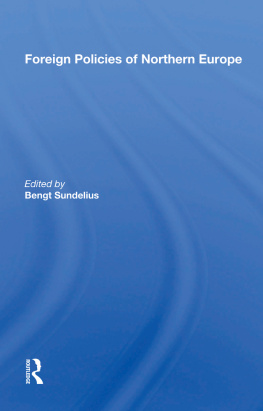Books by Richard F. Staar
Arms Control: Myth Versus Reality (editor)
Aspects of Modern Communism (editor)
Communist Regimes in Eastern Europe
Long-Range Environmental Study of the Northern Tier of Eastern Europe in 19902000
Poland 19441962: Sovietization of a Captive People
Public Diplomacy: USA Versus USSR (editor)
Soviet Military Policies Since World War Two (co-author)
USSR Foreign Policies After Detente
Yearbook on International Communist Affairs (editor)
The Hoover Institution on War, Revolution and Peace, founded at Stanford University in 1919 by the late President Herbert Hoover, is an interdisciplinary research center for advanced study on domestic and international affairs in the twentieth century. The views expressed in its publications are entirely those of the authors and do not necessarily reflect the views of the staff, officers, or Board of Overseers of the Hoover Institution.
Hoover Press Publication 359
Copyright 1987 by the Board of Trustees of the Leland Stanford Junior University
All rights reserved. No part of this publication may be reproduced, stored in a retrieval system, or transmitted in any form or by any means, electronic, mechanical, photocopying, recording, or otherwise, without written permission of the publisher.
Revised edition, first printing, 1987
First edition, 1985
Manufactured in the United States of America
91 90 89 88 87 9 8 7 6 5 4 3 2 1
Library of Congress Cataloging in Publication Data
Staar, Richard Felix, 1923
U.S.S.R. foreign policies after detente.
Bibliography: p.
Includes index.
1. Soviet UnionForeign relations1975
2. Soviet Union. Ministerstvo inostrannykh del. 3. TSK KPSS. Politb

ro. 4. Propaganda, Russian. 5. Espionage, Russian. 6. Soviet UnionMilitary policy. 7. Soviet UnionForeign economic relations. I. Title.
DK274.S7 1987 327.47 86-27655
ISBN 0-8179-8592-1 (pbk.)
Design by Lorena Laforest Bass
ISBN-13: 978-0-8179-8593-6 (electronic)
TO
USMC COMMAND AND STAFF COLLEGE STUDENTS AND FACULTY (19711981) WHO PROVIDED THE INSPIRATION FOR THIS BOOK
TABLES
FIGURES
PREFACE
This monograph is organized into twelve chapters. It begins with the USSR world outlook and attempts to show how Soviet perceptions differ from those of the West. Next, the Politburo's decision-making process and the problem of succession are discussed; historically the latter has almost always involved a protracted struggle for power. The third chapter deals with implementation of policies by the USSR Ministry of Foreign Affairs.
The second part of the book (Chapters ) treats the instruments of Soviet foreign policy: propaganda, espionage and active measures, military strategy, trade. All play significant roles in the orchestration of USSR moves throughout the world.
Finally, Part Three takes a geographic approach and covers the Soviet colonial empire in Eastern Europe, relations between East and West in Europe, the Third World, the USSR in East Asia, and finally Soviet relations with the United States.
The author expresses his deep appreciation to his assistant, Joyce Cerwin, for her invaluable help throughout the laborious process of preparing the revised edition for publication. This book could not have been written without access to the world-famous library collections at the Hoover Institution on War, Revolution and Peace. The staff has been outstanding in its dedication to the pursuit of esoteric and elusive data.
INTRODUCTION
The current Soviet collective leadership appears to have a comparatively realistic view of what is possible to accomplish in the world arena, and yet it has re-emphasized the doctrinal component of foreign policy by making Egor K. Ligachev, deputy to the ruling party's general-secretary, directly responsible for ideology. That is to say, the foreign policy of the USSR is still guided by a dogma that remains messianic in its very nature. According to this doctrine, the world revolutionary process has no timetable and may indeed experience temporary setbacks. In the long run, however, those who sit in the Kremlin believe that their political and socio-economic system will prevail over that of the West in general and of the United States in particular.
Soviet ideology continues to envision the communist movement as essentially international in character. The core of fifteen party-states, two of which are antagonistic and three others neutral toward the USSR, is supported by communist organizations in about eighty other countries or administrative units throughout the world. The so-called national liberation movements, restricted for the most part to Africa and the Middle East, are considered to be allies of the Soviet Union in the struggle against the imperialist camp headed by the United States. In addition, communism is seen as eventually spreading throughout Latin America from its two beachheads in Cuba and Nicaragua.
Nonetheless, regarding immediate prospects for expansion, the politburocrats in Moscow seemed incapable of making any decisions of major significance until the succession problem had been resolved. The deaths of Leonid I. Brezhnev, Iurii V. Andropov, and Konstantin U. Chernenko within a 28-month period brought Mikhail S. Gorbachev to the top leadership position. At age 54, he was of the next generation from his three immediate predecessors and therefore may be more likely to attempt important changes.
In view of the fact that decisions will be arrived at collectively until Gorbachev or another man emerges and has been able to promote a majority of his own supporters into the Politburo, the current period of weakness in the Kremlin may last for several more years. During that time, implementation of basic foreign policy decisions will continue to be conducted by the men in the Ministry of Foreign Affairs bureaucracy. These officials, however, also view world developments in terms of Marxism-Leninism. Such a doctrinal framework inevitably tends to slant information dispatched from abroad on the basis of which foreign policy decisions must be made. Indeed, at times it would appear that the ruling politburocrats are the victims of a distorted view of the world, that is, the one projected by their own propaganda.
One of the oldest instruments of political warfare, applied by the Soviet regime from its very inception, has been propaganda directed at foreign audiences. Specific campaigns are supervised by the Propaganda Department in the central party apparatus, which decides how to present different aspects of USSR external policy to various publics. Slogans appearing twice each year, in April and October, provide the general themes that will be used. International communist front organizations, like the World Peace Council, are tools for dissemination of such propaganda and promote Soviet foreign policy. Their activities are supplemented by use of the printed word and by radio broadcasts via official as well as clandestine transmitters.
Press agencies and newspapers also provide cover for USSR intelligence officers, whose assignments involve espionage and implementation of so-called active measures. The latter include the use of fronts, manipulation of foreign media, the spreading of disinformation, the planting of forgeries, and the recruitment of so-called agents of influence to promote the Kremlin's objectives and undermine those of any opponent. Between one-fourth and one-third of all Soviet officials abroad work for the KGB (civilian) or GRU (military) intelligence services. The United Nations is heavily penetrated by such individuals.
 ro. 4. Propaganda, Russian. 5. Espionage, Russian. 6. Soviet UnionMilitary policy. 7. Soviet UnionForeign economic relations. I. Title.
ro. 4. Propaganda, Russian. 5. Espionage, Russian. 6. Soviet UnionMilitary policy. 7. Soviet UnionForeign economic relations. I. Title.
